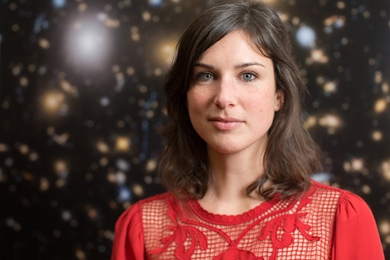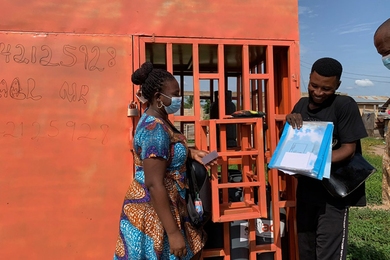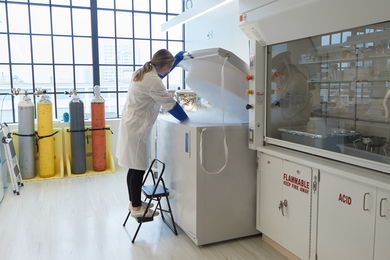The ships include tankers, which transport oils and chemicals; bulk carriers, which haul items such as coal, grain, and cement; and container ships, which move manufactured items in truck-size containers. Together, these merchant ships carry out more than 70 percent of all U.S. trade by volume, accounting for more than $3 trillion of economic activity annually.
But the maritime shipping world is “a really hard area to get new technologies adopted, because of the massive scale,” says Simmy Dhawan Willeman, an MIT graduate student studying maritime shipping and innovation. “A ship is so huge that it usually isn’t owned by one entity, but multiple entities. There are ship designers, builders, brokers, and funders. Ships are insured, and there’s insurance for that insurance, and it’s so complex that you have to talk to many players to get involved in technological innovation.” New technologies are usually adopted in a conservative, knee-jerk fashion, Willeman says. For example, the requirement for double hulls on oil tankers was instituted only after the 1989 Exxon Valdez oil spill prompted the Oil Pollution Act in 1990.
Willemann graduated with a B.S. in Naval Architecture and Marine Engineering from Webb Institute, a unique college with only 80 students who all study the same major in a waterfront mansion on Long Island. Looking for a higher-level understanding of shipping markets to build on her engineering background, she came to MIT to work with Professor Emeritus Henry Marcus, one of the most prestigious scholars in marine systems who taught ocean transportation systems, international logistics, and shipbuilding at MIT starting in 1971.
With support from the American Bureau of Shipping, Willeman and Marcus conducted an economic study to inform the future of oil tanker design. Willemann studied the variability in shipping market cycles and made a scenario planning tool for ship owners to determine which ship designs and speeds would be favorable under varying market and fuel price conditions. Today, there is a trend of slow steaming, but Willemann and Marcus showed that faster speeds could be advantageous when the markets pick up.
New opportunities in ocean engineering systems management
Professor Marcus, now retired, was the chairman of the Ocean Systems Management Program in the Department of Ocean Engineering for much of his MIT career. The program offered master’s and doctoral degrees to engineering students interested in the business and management aspects of ocean engineering systems. But in 2005, the Department of Ocean Engineering merged into the Department of Mechanical Engineering to become the Center for Ocean Engineering, and the ocean systems management track closed down.
Despite this, opportunities at MIT to pursue business and management issues in ocean shipping are on the rise. Responding to high demand in the ocean shipping industry, the Department of Mechanical Engineering recently forged a collaboration with the MIT Sloan School of Management‘s Leaders in Global Operations (LGO) dual-degree program to offer a new track in ocean engineering systems management. The young program’s very first graduate student, Andreas Christogiannis LGO ’14, a former ship sale broker, studies the economics of commodities and energy, geostrategic issues, and offshore operations.
Giovani Diniz, who began a master’s in naval architecture and marine engineering at MIT in 2013, is coding a software program to design ship propellers and improve propeller efficiency. His career in naval architecture has spanned continents and industries, including analyzing the designs of hydroelectric plants, overseeing the planned maintenance program of the Brazilian cabotage fleet, and supervising the construction of container ships. Vasileios Georgiadis, a student in the Naval Construction & Engineering Program and the master’s program in system design and management, served as an engineering duty officer for the Hellenic Navy for seven years, overseeing propulsion/electrical plant operations, analyzing and resolving malfunctions, performing maintenance/logistics scheduling, and leading firefighting teams.






